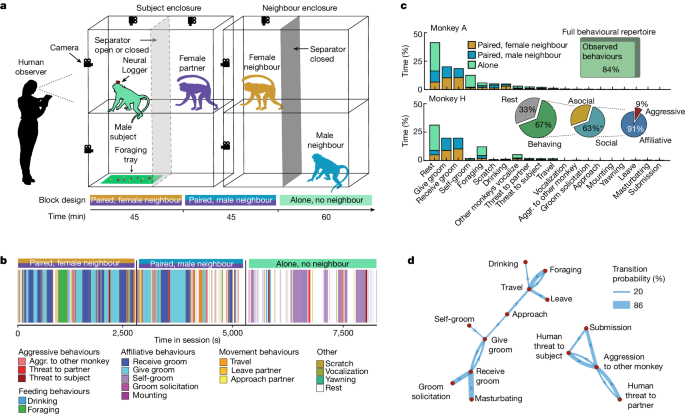Neural Signatures of Natural Behavior in Socializing Macaques
แนวคิดหลัก
The author explores the neural signatures of natural behavior in socially interacting macaques, highlighting the importance of studying primate behavior in more natural settings to understand their social dynamics.
บทคัดย่อ
This study delves into the neurobiology of primate behavior, emphasizing the significance of observing natural behaviors rather than artificial tasks. By combining ethological analysis and technology, the research uncovers how neural activity encodes species-typical behaviors and social interactions in rhesus macaques. The findings shed light on the intricate social dynamics and communal life within primate societies, offering insights into empathy, partnerships, and alliances.
Neural signatures of natural behaviour in socializing macaques - Nature
สถิติ
Single-neuron and population activity encoded 24 species-typical behaviors.
Male-female partners demonstrated near-perfect reciprocity in grooming.
Neural activity maintained a running account of social investments.
Behavioral and neural responses reflected empathy when confronted with an aggressive intruder.
คำพูด
"Our findings reveal a highly distributed neurophysiological ledger of social dynamics."
"Male-female partners demonstrated near-perfect reciprocity in grooming."
ข้อมูลเชิงลึกที่สำคัญจาก
by Cami... ที่ www.nature.com 03-13-2024
https://www.nature.com/articles/s41586-024-07178-6
สอบถามเพิ่มเติม
How do these neural signatures compare to human social behavior patterns
The neural signatures identified in socially interacting macaques share similarities with human social behavior patterns. Just like humans, macaques exhibit reciprocity in grooming behaviors, a key aspect of forming friendships and alliances. The prefrontal and temporal cortex activity observed in macaques encoding species-typical behaviors and social context can be compared to the neural mechanisms underlying social cognition in humans. This suggests that there may be shared neurobiological foundations for social interactions across primate species.
What are the implications for studying empathy in primates compared to other species
Studying empathy in primates, particularly through the lens of neural activity during social interactions, provides valuable insights into the evolutionary origins of this complex trait. By examining how macaques demonstrate empathy towards their partners when faced with an aggressive intruder, researchers can gain a deeper understanding of the neural basis of empathetic responses in non-human primates. Comparing these findings to other species allows for a more comprehensive exploration of empathy as a socio-emotional phenomenon that has evolved within different ecological and social contexts.
How can these findings be applied to improve understanding of human relationships
The findings on neural signatures of natural behavior in socially interacting macaques offer significant implications for understanding human relationships. By extrapolating from the neurophysiological ledger observed in macaque societies, researchers can potentially apply similar methodologies to investigate the neural underpinnings of human social dynamics. This comparative approach could shed light on how our own brains process and encode various aspects of interpersonal relationships, such as reciprocity, cooperation, and empathy. Ultimately, leveraging these insights could lead to a more nuanced comprehension of the complexities inherent in human social behavior and pave the way for novel interventions aimed at enhancing relationship quality and well-being among individuals.
0
